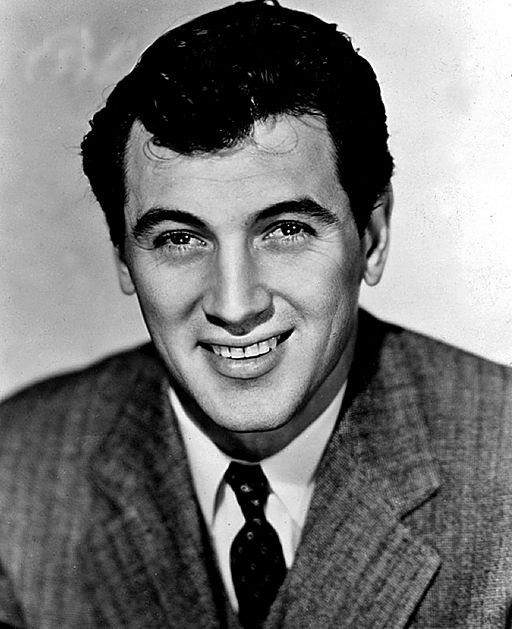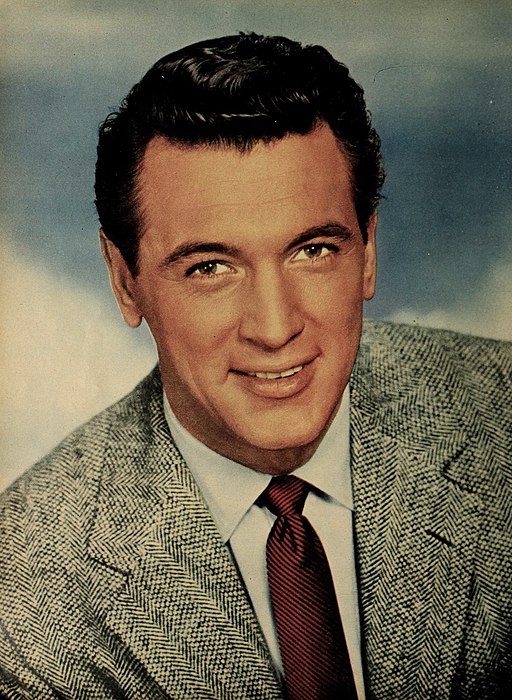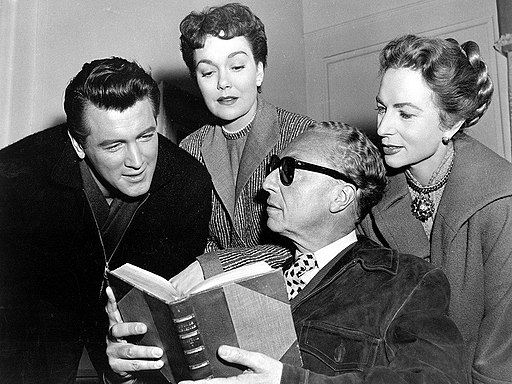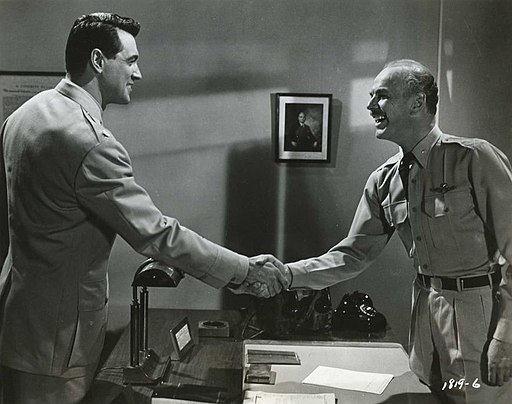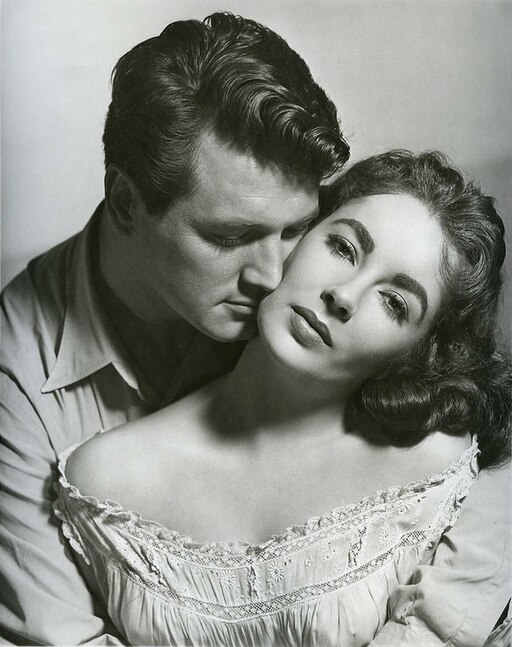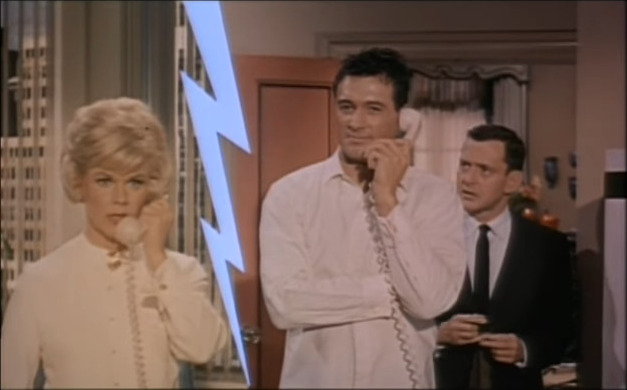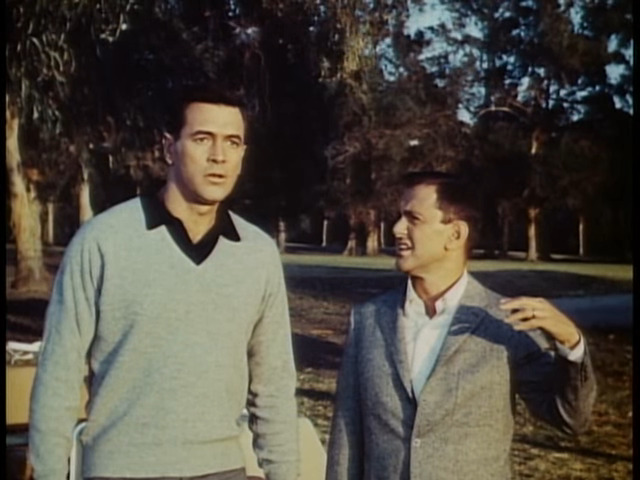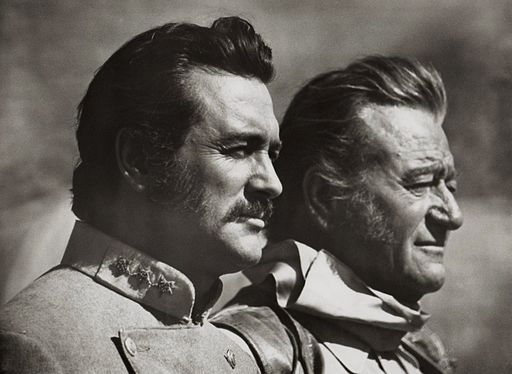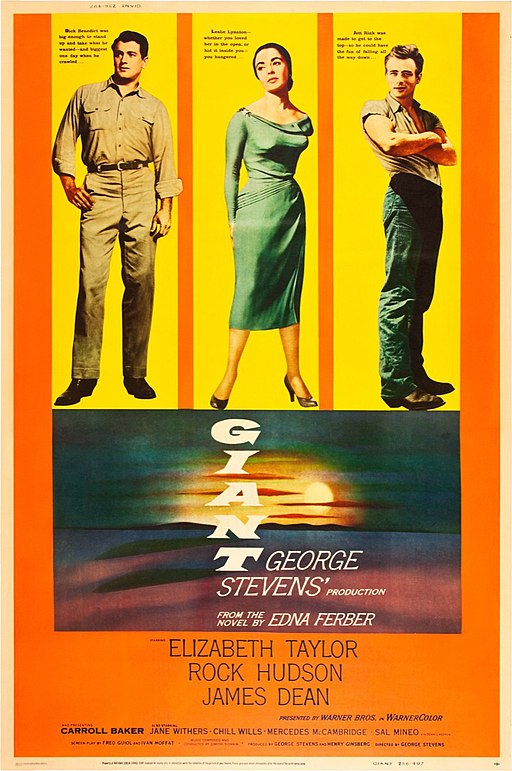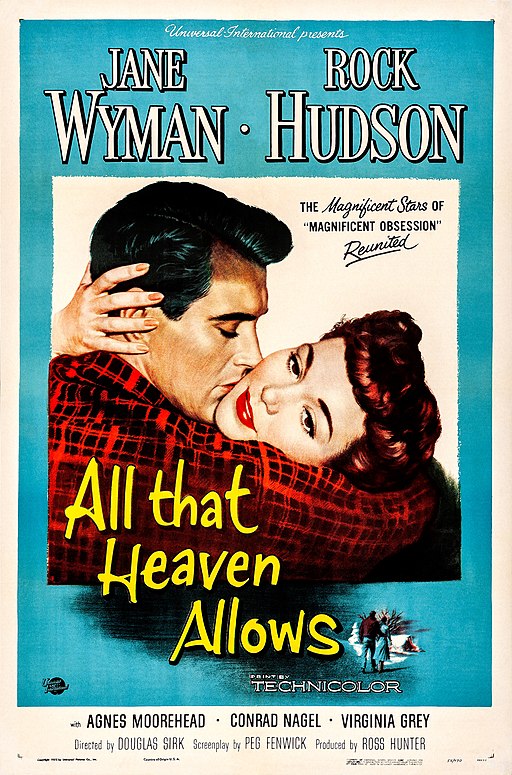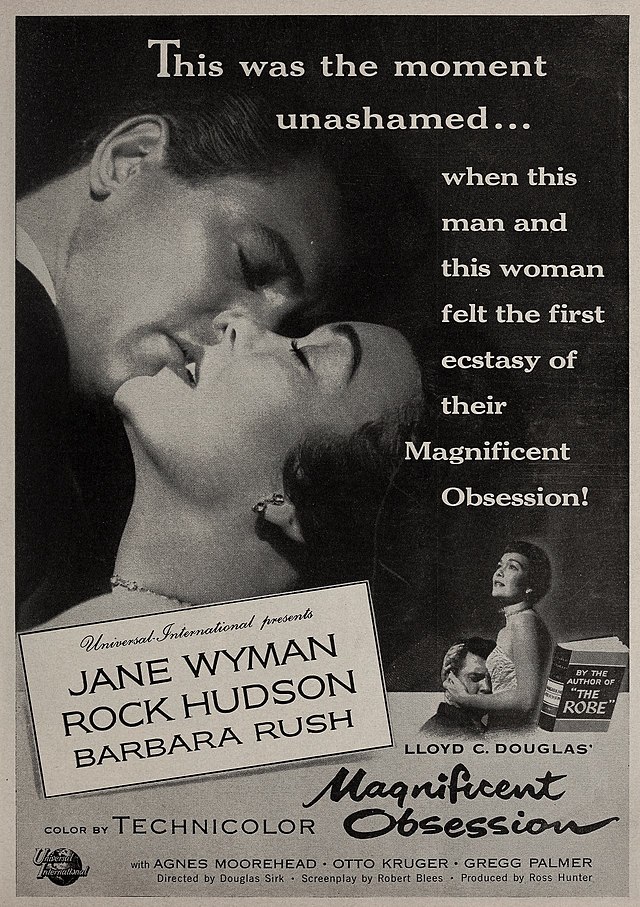Rock Hudson
back| Full Name | Roy Harold Scherer Jr. |
| Stage Name | Rock Hudson |
| Born | November 17, 1925 |
| Birthplace | Winnetka, Illinois, USA |
| Died | October 2, 1985 |
| Buried | His ashes were scattered at sea |
| Married to | Phyllis Gates (1955–1958) |
| Children | None |
| Notable films | Magnificent Obsession (1954) - Giant (1956) - Pillow Talk (1959) - Lover Come Back (1961) - Send Me No Flowers (1964) |
Rock Hudson
Hollywood’s romantic icon of charm
Rock Hudson, born Roy Harold Scherer Jr. on November 17, 1925, in Winnetka, Illinois, rose to become one of Hollywood's most iconic leading men. His career, spanning several decades, was marked by charismatic performances in a variety of genres.
Hudson's breakthrough came in the 1950s with films like "Magnificent Obsession" (1954) and "All That Heaven Allows" (1955), where his combination of good looks and genuine acting chops won audience's hearts. His role in "Giant" (1956) earned him an Academy Award nomination, solidifying his status as a top-tier actor.
Perhaps best known for his romantic comedies with Doris Day, including "Pillow Talk" (1959), Hudson showcased his versatility and excellent comedic timing. His transition to television in the 1970s with shows like "McMillan & Wife" further demonstrated his range.
Hudson's personal life remained private, and his homosexuality was a well-guarded secret until the later years of his life. His AIDS diagnosis in 1984 and subsequent death on October 2, 1985, brought significant attention to the disease and helped shift public perception.
Remembered for his suave on-screen persona and his groundbreaking role in the early public discussion of AIDS, Rock Hudson remains a significant figure in Hollywood history.
Related
Rock Hudson
Biography, analysis and all movies
Rock Hudson was a prominent American actor, a leading man in Hollywood throughout the 1950s and 1960s. Born Roy Harold Scherer Jr. in Winnetka, Illinois, he faced a challenging childhood with an absent father and a struggling mother. After serving in the Navy during World War II, he moved to California to pursue acting.
Early Career
Hudson's film career began with small roles, but his good looks and charm soon caught the attention of Hollywood. He was signed by Universal Pictures and changed his name to Rock Hudson. His early roles were largely in B-movies, but his talent and appeal were undeniable.
Rise to Fame
Hudson’s breakout role came with "Magnificent Obsession" (1954), where his performance as a reckless playboy turned responsible doctor garnered critical acclaim. This success was followed by "All That Heaven Allows" (1955) and the epic "Giant" (1956), for which he received an Academy Award nomination.
Romantic Comedies
Hudson is perhaps best remembered for his romantic comedies with Doris Day, including "Pillow Talk" (1959), "Lover Come Back" (1961), and "Send Me No Flowers" (1964). These films showcased his comedic timing and on-screen chemistry with Day.
Later Career
In the later stages of his career, Hudson transitioned to television, starring in shows like "McMillan & Wife" and making guest appearances on various series.
Personal Life
Rock Hudson's personal life was kept private, with his homosexuality remaining a secret from the general public until the later part of his career. His marriage to Phyllis Gates was short-lived and ended in divorce.
Illness and Death
Hudson was diagnosed with AIDS in 1984, becoming one of the first high-profile figures to suffer from the disease. His public acknowledgment of his illness helped raise awareness about AIDS at a time when the disease was little understood and highly stigmatized.
Legacy
Rock Hudson's legacy is twofold: he is remembered both as a talented actor who was a quintessential leading man of his era, and as a figure who brought significant attention to the AIDS crisis. His death in 1985 marked a pivotal moment in the public's understanding of the disease. Hudson is remembered for his charismatic screen presence and is considered an important figure in Hollywood's history.
Rock Hudson controversies about being gay:
Rock Hudson's sexuality was a subject of significant controversy and interest, particularly during a time when Hollywood and society at large were far less accepting of homosexuality.
Private Life in a Different Era
Throughout most of his career, Hudson's homosexuality was a well-kept secret. The Hollywood of Hudson's era was not conducive to openly gay actors, as public knowledge of an actor's homosexuality could have severely damaged their career. Studios often arranged dates, and even marriages, to maintain their stars' public images.
Marriage to Phyllis Gates
In 1955, Hudson married Phyllis Gates, a union that was widely seen as a protective measure against rumors about his sexual orientation. The marriage ended in divorce after three years. Later reports and biographies suggest that Gates may have been aware of Hudson's sexuality, though this remains a topic of debate.
Public Revelation and Impact
The public revelation of Hudson's homosexuality came only towards the end of his life, following his diagnosis with AIDS in 1984. This announcement was a pivotal moment in the history of the AIDS pandemic, bringing unprecedented attention to the disease. Hudson's stature as a beloved film star and his struggle with AIDS helped shift public perception, fostering greater awareness and empathy towards the LGBTQ+ community and those affected by the disease.
Legacy of his homosexualtiy
While the revelation about his sexuality and his illness was initially met with a variety of reactions, including shock and support, it ultimately played a role in changing attitudes towards homosexuality and AIDS in society. Hudson is now often remembered not only for his cinematic legacy but also for being one of the first high-profile figures to bring attention to the AIDS crisis and for contributing to a broader conversation about homosexuality in the entertainment industry.
In summary, while Rock Hudson's sexuality was a source of controversy during his lifetime, its revelation played a significant role in advancing public dialogue about homosexuality and AIDS. His legacy in this regard is as complex as it is impactful, marking a turning point in societal attitudes.
Notable movies featuring Rock Hudson:
1950s:
- "Magnificent Obsession" (1954): Hudson plays a reckless playboy who becomes a surgeon to redeem himself after causing a tragedy.
- "All That Heaven Allows" (1955): A romantic drama where Hudson portrays a younger gardener who falls in love with an older, wealthy widow.
- "Giant" (1956): In this epic drama, Hudson plays a Texas rancher in a story spanning two generations.
- "Written on the Wind" (1956): A melodrama where he portrays a steadfast friend caught in a troubled Texas oil family.
- "Pillow Talk" (1959): A romantic comedy where Hudson plays a playboy composer, engaging in a telephone feud with a career woman, played by Doris Day.
1960s:
- "Lover Come Back" (1961): Hudson and Doris Day reunite in this romantic comedy about rival advertising executives.
- "Come September" (1961): A light-hearted comedy where Hudson's character deals with unexpected guests at his Italian villa.
- "Send Me No Flowers" (1964): A comedy featuring Hudson as a hypochondriac who mistakenly believes he's dying.
- "Strange Bedfellows" (1965): A political comedy with Hudson playing a man trying to impress his estranged wife.
- "Seconds" (1966): A sci-fi drama where he portrays a middle-aged man who undergoes a procedure to start a new life with a different appearance.
1970s and 1980s:
- "Ice Station Zebra" (1968): A Cold War thriller with Hudson as a submarine commander on a covert mission.
- "Pretty Maids All in a Row" (1971): A black comedy where he plays a high school counselor involved in a murder mystery.
- "The Ambassador" (1984): One of his last films, a political thriller about Middle Eastern conflicts.
Analysis of Rock Hudson’s acting style:
Rock Hudson's acting style was characterized by his natural charisma, suave demeanor, and an understated approach that made him one of the most popular leading men in Hollywood during his prime. His performances were marked by several key attributes:
Charismatic Presence
Hudson's on-screen presence was undeniably charismatic. He had the classic good looks and charm that made him ideal for romantic leads and heroic roles. His tall, handsome appearance, coupled with a deep, resonant voice, made him instantly captivating.
Versatility
While often cast in romantic comedies and dramas, Hudson showed versatility throughout his career. He successfully navigated roles in action films, war movies, and even ventured into darker, more complex characters, as seen in films like "Seconds." His ability to adapt to various genres showcased his range as an actor.
Subtle and Understated Performance
Hudson was not an actor who relied on over-the-top expressions or dramatic outbursts. Instead, his performances were often understated, relying on subtle expressions and gestures to convey his character's emotions and thoughts. This subtlety made his acting style appear effortless and natural.
Chemistry with Co-Stars
Hudson's on-screen chemistry with his co-stars, especially in romantic comedies, was a significant aspect of his appeal. His pairings with actresses like Doris Day and Lauren Bacall were particularly well-received, and these collaborations produced some of the most memorable romantic films of the 1950s and 1960s.
Evolution Over Time
As Hudson's career progressed, so did his acting style. He moved from the charming, often light-hearted roles of his early career to more serious and challenging parts. This evolution showed his willingness to grow as an actor and take on roles that pushed him beyond the persona that initially made him famous.
Physicality
Hudson also used his physicality effectively, whether in action sequences or in portraying the strength and ruggedness of his characters. His stature and bearing contributed to his believability in a variety of roles.
In summary, Rock Hudson's acting style was marked by his charismatic screen presence, versatility, and an understated approach that resonated with audiences. His performances, often characterized by a smooth and effortless charm, contributed significantly to his status as one of Hollywood's most beloved actors.
Remarkable quotes from Rock Hudson:
On His Career:
- "I never tried to project any image at all, other than just being me."
On Love and Relationships:
- "Love is a many splendored thing, and you better start splurging if you're going to catch the real thing."
On Acting:
- "I'm not a great actor — let's face it. I don't have a great deal of choice in the roles I get. Beggers can't be choosers."
On His Public Image:
- "I learned that you can't have any secrets. It's silly to try, because they always come out."
Reflecting on Life:
- "When I'm old and gray and I'm sitting on my porch, I'll be thinking about the good old days and how I survived it all."
On Personal Growth:
- "You have to keep your sense of humor in this business."
Awards and Nominations:
Academy Awards (Oscars):
- Nominated for Best Actor in a Leading Role for "Giant" (1956).
Golden Globe Awards:
- Won the Golden Globe for World Film Favorite – Male (1959).
- Nominated for Best Actor in a Motion Picture – Drama for "Giant" (1957).
- Received several other nominations for World Film Favorite.
Other Honors:
- Rock Hudson has a star on the Hollywood Walk of Fame for his contributions to the motion-picture industry, located at 6116 Hollywood Blvd.
- Although not an award, Hudson's role in "Giant" alongside James Dean and Elizabeth Taylor is often cited as one of his most significant contributions to film, further cementing his legacy in Hollywood.
While his awards list may not be as extensive as some of his contemporaries, Hudson's impact on the film industry was significant, particularly in the romantic comedy genre and his memorable roles in classic Hollywood films.
Analysis of Rock Hudson’s performance in the film “Giant”:
In "Giant" (1956), Rock Hudson delivered one of his most acclaimed performances, portraying Jordan "Bick" Benedict Jr., a wealthy Texas rancher. Directed by George Stevens, the film is an epic drama spanning over two decades, exploring themes of family, power, and social change. Here's an analysis of Hudson's performance:
Complex Character Development
Hudson's character, Bick Benedict, is complex and evolves significantly over the course of the film. Initially, Bick is portrayed as a traditional, somewhat arrogant Texas rancher with a firm belief in the status quo. Hudson effectively captures this initial rigidity, yet as the narrative progresses, he skillfully reveals Bick's growing awareness and changing attitudes, especially regarding racial and social issues.
Subtle Emotional Nuance
Hudson's performance is marked by a nuanced portrayal of a man caught between tradition and progress. He conveys subtle emotional shifts as Bick confronts his own prejudices and limitations. Hudson's ability to portray internal conflict through minimal expressions and gestures adds depth to the character.
Chemistry with Co-Stars
Hudson displayed a compelling on-screen chemistry with Elizabeth Taylor (Leslie Lynnton Benedict) and James Dean (Jett Rink). This dynamic added layers to the narrative, particularly in the complex relationship between Bick and Leslie, where Hudson balances between affection, stubbornness, and eventual growth.
Physical Presence
Hudson's physical presence is significant in "Giant." He uses his stature and demeanor to embody the initially imposing figure of a ranch owner. As the film progresses, his physicality subtly shifts to reflect Bick's emotional and ideological journey.
Cultural and Social Commentary
Through his character, Hudson addresses the evolving social landscape of Texas, including issues of racism, classism, and industrialization. His performance is pivotal in delivering the film's commentary on these themes.
Dramatic Range
"Giant" showcases Hudson's dramatic range, from his portrayal of a young, confident rancher to an older, more introspective family man. The role required Hudson to age significantly, both physically and in temperament, a challenge he met convincingly.
In summary, Rock Hudson's performance in "Giant" is a testament to his ability as a leading man capable of delivering complex, nuanced performances. He brought depth and humanity to Jordan "Bick" Benedict Jr., contributing significantly to the film's enduring impact as a classic of American cinema. Hudson's portrayal in "Giant" not only earned him critical acclaim but also solidified his position as a talented and versatile actor.
All movies with Rock Hudson:
1940s:
- 1948: "Fighter Squadron"
1950s:
- 1950: "Peggy," "Winchester '73," "The Desert Hawk," "Shakedown"
- 1951: "Tomahawk," "Air Cadet," "Bright Victory," "The Fat Man," "Iron Man"
- 1952: "Bend of the River," "Scarlet Angel," "Has Anybody Seen My Gal?"
- 1953: "The Lawless Breed," "Seminole," "Back to God's Country," "Gun Fury," "Sea Devils"
- 1954: "Taza, Son of Cochise," "Magnificent Obsession"
- 1955: "Captain Lightfoot," "All That Heaven Allows"
- 1956: "Never Say Goodbye," "Giant," "Written on the Wind"
- 1957: "Battle Hymn," "Something of Value"
- 1958: "A Farewell to Arms," "This Earth Is Mine"
- 1959: "Pillow Talk"
1960s:
- 1960: "The Last Sunset"
- 1961: "Come September," "Lover Come Back"
- 1962: "The Spiral Road"
- 1963: "Marilyn," "A Gathering of Eagles"
- 1964: "Man's Favorite Sport?," "Send Me No Flowers"
- 1965: "Strange Bedfellows"
- 1966: "Blindfold," "Seconds"
- 1967: "Tobruk"
- 1968: "A Fine Pair," "Ice Station Zebra"
- 1969: "The Undefeated"
1970s:
- 1970: "Hornets' Nest"
- 1971: "Pretty Maids All in a Row"
- 1972: "Showdown"
- 1973: "Embassy"
- 1976: "The Ambassador," "Twilight's Last Gleaming"
- 1978: "Avalanche," "The Mirror Crack'd"
1980s:
- 1980: "The Martian Chronicles" (TV Mini-Series)
- 1984: "The Vegas Strip War" (TV Movie)
- 1985: "Dynasty" (TV Series)

